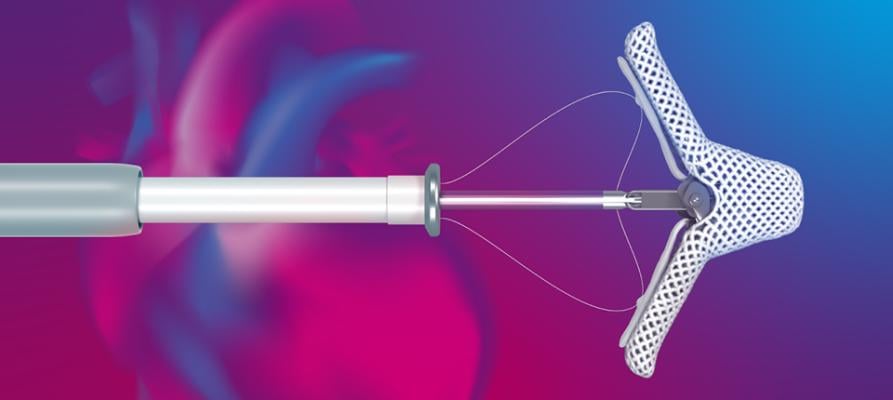
June 9, 2022 — Abbott announced late-breaking data for MitraClip, the world's first transcatheter edge-to-edge repair (TEER) device, and TriClip, a first-of-its kind minimally invasive tricuspid heart valve repair device. The data reinforce the capabilities of the company's structural heart solutions for both mitral and tricuspid regurgitation (MR and TR) across a broad range of patient groups battling leaky heart valves.
Historically, treatment options for MR and TR have been limited. Prior to MitraClip and TriClip, open-heart surgery was the only treatment for these conditions, but not all patients were eligible due to the potential risk of complications stemming from comorbidities, advanced age or other issues.
The new data were presented at TVT: The Structural Heart Summit, the annual meeting from the Cardiovascular Research Foundation, held in Chicago from June 8-10, 2022.
One-Year Results from the MitraClip EXPAND Study
The global EXPAND study is the largest contemporary, real-world study of MitraClip NTR/XTR that used an independent echo core lab and clinical events committee. The analysis of one-year clinical and functional outcomes demonstrates the benefit of MitraClip in secondary MR patients both within the eligibility criteria for Abbott's COAPT trial – which studied symptomatic heart failure patients with moderate-to-severe or severe secondary MR – and outside COAPT eligibility, including patients with moderate at baseline MR and patients with advanced heart failure. The data across all patient groups through one year showed:
- Significant MR reduction to ≤1+ MR (81.3%-97.2%)
- Improvements in New York Heart Association (NYHA) class (a classification of functional limitations resulting from cardiac disease) and quality of life from baseline
- Comparable all-cause mortality and heart failure hospitalization rates
"Doctors have been using the eligibility criteria from Abbott's COAPT trial to identify heart failure patients with secondary mitral regurgitation (MR) who would benefit from MitraClip treatment," said Gilbert Tang, M.D., MSc, MBA, surgical director, Structural Heart Program, Mount Sinai Health System and professor of cardiovascular surgery, Icahn School of Medicine at Mount Sinai. "The real-world findings from this study show that excellent MR reduction and one-year outcomes were achieved by MitraClip not only in COAPT-like patients but also in a wider group of patients outside the COAPT criteria, meaning physicians may be able to help even more people with secondary MR. It'll be interesting to continue following the progress of these heart failure patients after MitraClip therapy."
Insights from TRILUMINATE and bRIGHT TriClip Studies
Patients with TR who are candidates for transcatheter repair commonly have a pacemaker lead across the tricuspid valve. Combined outcomes from the TRILUMINATE and bRIGHT prospective, single arm, multi-center trials examined whether TR patients previously implanted with a pacemaker lead can benefit from the TriClip device and is the first report focusing on this group. In patients with TR and a pacemaker lead across the tricuspid valve, the following 30-day results of the TriClip and TriClip G4 TEER systems were demonstrated:
- High rate of implant (98%) and acute procedural (91%) success
- At least a two-grade TR reduction in 64% of patients
- Life-changing clinical improvements including 69% of patients achieving NYHA Functional Class I/II, an improvement by 57% from baseline of 12%, with a marked 19-point improvement in Kansas City Cardiomyopathy Questionnaire (KCCQ) score (a self-assessment of symptoms, physical and social limitations, and quality of life in patients with heart failure)
"This late-breaking data debunks traditional thinking that patients with pacemakers may not be eligible for or respond to tricuspid TEER therapy," said Georg Nickenig, M.D., professor and chair, Heart Center at University Hospital Bonn, Germany. "The findings continue to demonstrate TriClip's ability to reduce TR and improve quality of life in a broad range of anatomies."
In addition to this late-breaking data, Abbott will also be presenting at TVT outcomes from the global EXPAND study supporting the MitraClip therapy in both women and men, as well as hemodynamic results from the multi-center, international, single arm, investigational Portico™ NG study evaluating the safety and effectiveness of the Navitor transcatheter aortic valve implantation system by valve size in patients with severe, symptomatic aortic stenosis at high or extreme surgical risk.
"These latest data presented at TVT represent compelling evidence of progress in our mission to help people live better lives through better health," said Michael Dale, senior vice president of Abbott's structural heart business. "Our minimally invasive therapies for the treatment of heart valve disease are proof positive of our commitment to better serve physicians and improve the benefit of the devices we offer to the patients they treat."
For U.S. important safety information on MitraClip: http://abbo.tt/MitraClipG4ISI.
The TriClip Transcatheter Tricuspid Valve Repair System and Navitor Transcatheter Aortic Valve are approved for investigational use only in the U.S.
Related MitraClip, Triclip, Amulet and Portico Content:
New Late-Breaking Data Highlight Abbott Structural Heart Transcatheter Valve Therapies
MitraClip Reduces Mortality for Heart Failure Patients With Secondary Mitral Regurgitation
VIDEO: MitraClip to Treat Heart Failure - Results of the COAPT Trial — Interview with William Abraham, M.D.,
VIDEO: Echocardiographic Findings in the COAPT Trial — Interview with Federico Asch, M.D.
FDA Approves MitraClip for Use in Heart Failure Patients With Functional Mitral Regurgitation
VIDEO: Impact of the COAPT Trial on Heart Failure Patients With Functional Mitral Regurgitation — Interview with Andreas Brieke, M.D.
Transcatheter Mitral Valve Repair is Cost-Effective in Heart Failure Patients
TAVR Expected to See Rapid Growth in Next 5 years
FDA Clears Abbott Amplatzer Amulet LAA Occluder to Reduce Stroke in People With Atrial Fibrillation
Portico TAVR System Found Safe and Effective for High-Risk Surgical Patients
Portico TAVR System Reduces Severe Aortic Stenosis at 30 Days in Real-World Setting


 May 16, 2022
May 16, 2022 
